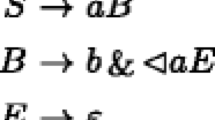Abstract
In this chapter we discuss practical LR-like parser generator models for Tree Adjoining Grammars (TAGs) and propose a new algorithm. The algorithm has been implemented and applied to two large coverage TAGs for English: the XTAG English grammar, and a grammar automatically extracted from the Penn Treebank. The generated tables have very favorable characteristics compared to an existing approach by Nederhof, undermining earlier beliefs that LR parsing for TAGs would be inadequate for parsing natural language. Indeed, our parser generator has been used to build fast accurate best-parse parsers for natural language, as reported in (Prolo, 2002a).
Access this chapter
Tax calculation will be finalised at checkout
Purchases are for personal use only
Preview
Unable to display preview. Download preview PDF.
Similar content being viewed by others
References
Aho, A. V. and Ullman, J. D. (1972). The Theory of Parsing, Translation, and Compiling, volume I: Parsing. Prentice-Hall, Englewood Cliffs, NJ, USA.
Briscoe, T. and Carroll, J. (1993). Generalized probabilistic LR parsing of natural language (corpora) with unification-based grammars. Computational Linguistics, 19(l):25–59.
Gorn, S. (1967). Explicit definitions and linguistic dominoes. In Proceedings of the Conference on Systems and Computer Science, pages 77–115, London, Ontario, Canada. University of Toronto Press.
Joshi, A. K., Levy, L., and Takahashi, M. (1975). Tree Adjunct Grammars. Journal of Computer and System Sciences, 10(1).
Joshi, A. K. and Schabes, Y. (1997). Tree-Adjoining Grammars. In Handbook of Formal Languages, volume 3, pages 69–123. Springer-Verlag, Berlin.
Kinyon, A. (1997). Un algorithme ďanalyse LR(0) pour les grammaires ďarbres adjoints lexicaliseées. In Genthial, D., editor, Quatrième conférence annuelle sur Le Traitement Automatique du Langage Naturel, Actes, pages 93–102, Grenoble, France.
Knuth, D. E. (1965). On the translation of languages from left to right. Information and Control, 8(6):607–639.
Lang, B. (1974) Deterministic techniques for efficient non-deterministic parsers. In Automata, Languages and Programming, 2nd Colloquium, volume 14 of Lecture Notes in Computer Science, pages 255–269, Saarbrücken. Springer-Verlag, Berlin.
Marcus, M., Kim, G., Marcinkiewicz, M. A., MacIntyre, R., Bies, A., Ferguson, M., Katz, K., and Schasberger, B. (1994). The Penn Treebank: Annotating predicateargument structure. In Proceedings of the 1994 Human Language Technology Workshop.
Merlo, P. (1996). Parsing with Principles and Classes of Information. Kluwer Academic Publishers, Boston, MA, USA.
Nederhof, M.-J. (1998). An alternative LR algorithm for TAGs. In Proceedings of the 36th Annual Meeting of the Association for Computational Linguistics and 16th International Conference on Computational Linguistics, Montreal, Canada.
Pereira, F. (1985). A new characterization of attachment preferences. In Dowty, D. R., Kartunen, L., and Zwicky, A. M., editors, Natural Language Parsing: Psychological, computational, and theoretical perspectives, pages 307–319. Cambridge University Press, New York, NY, USA.
Prolo, C. A. (2002a). Fast 1r parsing using rich (tree adjoining) grammars. In Proceedings of Seventh Conference on Empirical Methods in Natural Language Processing, pages 103–110, Philadelphia, PA, USA.
Prolo, C. A. (Feb., 2002b). LR parsing for Tree Adjoining Grammars and its application to corpus-based natural language parsing. Ph.D. Dissertation Proposal, Department of Computer and Information Science, University of Pennsylvania.
Schabes, Y. (1990). Mathematical and Computational Aspects of Lexicalized Grammars. PhD thesis, Department of Computer and Information Science, University of Pennsylvania.
Schabes, Y. and Vijay-Shanker, K. (1990). Deterministic left to right parsing of tree adjoining languages. In Proceedings of 28th Annual Meeting of the Association for Computational Linguistics, pages 276–283, Pittsburgh, Pennsylvania, USA.
Schabes, Y. and Waters, R. C. (1995). Tree Insertion Grammar: a cubic-time, parsable formalism that lexicalizes Context-Free Grammar without changing the trees produced. Computational Linguistics, 21(4):479–513.
Shieber, S. and Johnson, M. (1993). Variations on incremental interpretation. Journal of Psycholinguistic Research, 22(2):287–318.
Shieber, S. M. (1983). Sentence disambiguation by a Shift-Reduce parsing technique. In Proceedings of the 21st Annual Meeting of the Association for Computational Linguistics, pages 119–122, Cambridge, MA, USA.
Tomita, M. (1985). Efficient Parsing for Natural Language. Kluwer Academic Publishers, Boston, MA, USA.
Wright, J. H. and Wrigley, E. N. (1991). GLR parsing with probability. In Tomita, M., editor, Generalized LR Parsing, pages 113–128. Kluwer Academic Publishers, Boston, MA, USA.
Xia, F. (1999). Extracting tree adjoining grammars from bracketed corpora. In Proceedings of the 5th Natural Language Processing Pacific Rim Symposium (NLPRS-99), Beijing, China.
XTAG Research Group, T. (1998). A Lexicalized Tree Adjoining Grammar for English. Technical Report IRCS 98-18, University of Pennsylvania.
Author information
Authors and Affiliations
Editor information
Editors and Affiliations
Rights and permissions
Copyright information
© 2004 Kluwer Academic Publishers
About this chapter
Cite this chapter
Prolo, C.A. (2004). An Efficient LR Parser Generator for Tree-Adjoining Grammars. In: Bunt, H., Carroll, J., Satta, G. (eds) New Developments in Parsing Technology. Text, Speech and Language Technology, vol 23. Springer, Dordrecht. https://doi.org/10.1007/1-4020-2295-6_7
Download citation
DOI: https://doi.org/10.1007/1-4020-2295-6_7
Publisher Name: Springer, Dordrecht
Print ISBN: 978-1-4020-2293-7
Online ISBN: 978-1-4020-2295-1
eBook Packages: Humanities, Social Sciences and Law




